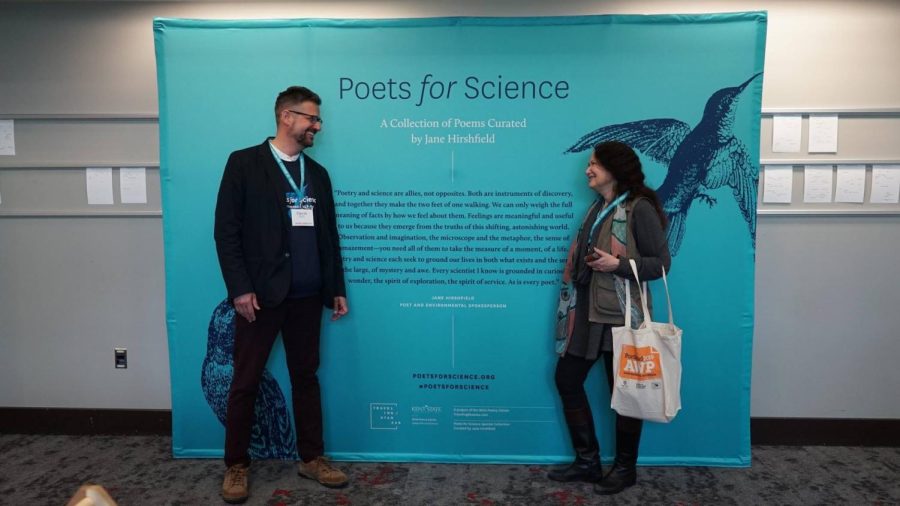Wick partners with Academy of American Poets to introduce ‘Emerge’ on Poets.org
David Hassler, the director of Wick Poetry Center, and Jane Hirshfield, a famous poet, converse at the 2019 Association of Writers and Writing Programs (AWP) Conference in Portland, Oregon, Thursday, March 28, 2019.
March 22, 2019
The Wick Poetry Center is partnering with the Academy of American Poets to launch a web-based version of their program, “Emerge,” on Poets.org, according to a press release.
Emerge is a digital tool based on the idea of erasure poetry.
“What we especially appreciated about Emerge was how the Wick team turned the idea of erasure poetry inside-out,” said Jennifer Benka, the executive director of the Academy of Americans Poets, in an email. “Instead of striking through text, Emerge users select words, which are then surfaced emphasizing the creative act of selection.”
Through Emerge, users have the opportunity to engage with base texts they may not otherwise work with, said David Hassler, the director of the Wick Poetry Center.
“Emerge can get people to do a close reading of a text,” Hassler said. “Students who’ve never read Martin Luther King’s ‘I Have a Dream’ speech actually read it if you upload it as an Emerge document. In order to make your own reflection or found poem or Emerge poem, you have to read the words. And you often slow down and reread them.”
The poetry center brought Emerge to the National Book Festival in Washington, D.C., last year through a partnership with the Library of Congress, where users had access to archived content like presidential papers from the late 1700s.
“People were waiting in line for 11 hours all day to play with that, to make poems from that,” Hassler said. “We had a kid … a 9-year-old, work with a text by Abe Lincoln. When he printed his Emerge card, he actually signed it ‘Abe and Ed.’ … It kind of questions originality and authorship, too. It kind of pushes the envelope there.”
Currently, users can access base texts on Poets.org on the topic of democracy through the Poetry Coalition’s programming “What is it Then, Between Us?: Poetry & Democracy” and on the topic of mass incarceration through the University of Arizona Poetry Center’s “Art for Justice” project.
Although Emerge often includes base texts from political figures and legislation, the goal of Emerge is to bring people together, Hassler said.
“I think one of the powerful things about poetry in general is it often connects us on a pre-political level and finds a kind of shared human experience or a way to connect with voices of the others,” he said. “So our goal at the Wick Poetry Center is not to politicize, but to humanize issues that are important and nonetheless have political ramifications.”
Overall, Emerge “emphasizes more of a creative conversation that a user can have with previous texts and make something new out of it,” Hassler said.
The poetry center’s staff began working on Emerge in 2016 with the “Traveling Stanzas” project after receiving a Knight Foundation grant. The program was used on iPads at various Wick Poetry Center exhibits.
Now, with the web-based version, users can choose from a selection of base texts “that speak to any issue or historical moment or important topic,” Hassler said. Then, users pick an excerpt, bold words that speak to them on the screen and gray-out the remaining base text. What is left is an Emerge poem.
Users then have the option to print or share their poem. All poems go into a digital gallery, showcasing poems from users across the country.
The poetry center staff works on the ideas for digital tools together, which then are contracted to Each + Every, a local firm that employs graduates of Kent State’s Visual Communication Design program. The university went through the legal process of registering Emerge as owned by Hassler and Jessica Jewell, the senior academic program director for the poetry center.
Wick received $30,000 from the Academy of Americans Poets, which paid for the adaptation of the program from iPad to web. In return, the Academy can use Emerge on Poets.org for free for at least two years.
Once the programming on democracy and mass incarceration are complete, Poets.org will continue to share other source texts for users to create, Benka said.
Alexandra Sobczak is a general assignment reporter. Contact her at [email protected].

























